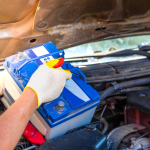When it comes to keeping your vehicle running smoothly, few things are as essential as a reliable car battery. Whether you’re facing the winter chill or the sweltering heat of summer, a well-functioning battery is crucial for starting your engine and powering your electrical systems. But what happens when your battery finally calls it quits? Understanding the cost of a car battery replacement is key for every driver.
In this article, we’ll break down the various factors that influence the price of a new battery, explore the different types available, and provide you with a handy price guide to help you make informed decisions. Whether you’re a seasoned car owner or a new driver, our friendly guide will equip you with all the knowledge you need to navigate this essential aspect of vehicle maintenance without breaking the bank. Let’s dive in!
Table of Contents
- Understanding the Factors That Influence Car Battery Replacement Costs
- Exploring Different Types of Car Batteries and Their Price Ranges
- Tips for Finding the Best Deals on Car Battery Replacement Services
- Signs Your Car Battery Needs Replacement and When to Act
- Q&A
- Wrapping Up

Understanding the Factors That Influence Car Battery Replacement Costs
When considering the cost of replacing a car battery, several factors come into play that can significantly influence the overall price. First, the type of battery required for your vehicle can vary widely based on its make and model. Standard lead-acid batteries are generally the most affordable, while premium absorbed glass mat (AGM) batteries or lithium-ion batteries tend to come at a higher price point due to their enhanced performance and lifespan. Additionally, the battery’s size and capacity, which are determined by the vehicle’s electrical requirements, will also affect costs. Other factors that can contribute to the price include:
Location: Geographic differences can lead to variations in labor and service fees.
Installation: Some mechanics might charge extra for installation, especially if they have to perform additional checks or services.
Warranty: Batteries with longer warranties may have a higher upfront cost but can save you money over time.
Furthermore, it’s essential to consider where you purchase your battery. Retailers such as auto parts stores often run promotions or provide discounts for installations, while dealership prices may be higher due to brand markup. To provide a clearer picture, here’s a simplified comparison of potential battery replacement costs:
| Battery Type | Average Cost | Installation Fee | Total Estimated Cost |
|---|---|---|---|
| Lead-Acid | $50 – $120 | $10 – $50 | $60 – $170 |
| AGM | $100 – $250 | $10 – $50 | $110 – $300 |
| Lithium-Ion | $200 – $500 | $10 – $50 | $210 - $550 |
Exploring Different Types of Car Batteries and Their Price Ranges
When it comes to car batteries, understanding the various types and their associated costs can make all the difference in ensuring your vehicle runs smoothly. The most common types include:
Lead-Acid Batteries: Typically the most affordable, these batteries can range from $50 to $150. They are widely used in older vehicles and are known for their reliability.
AGM (Absorbent Glass Mat) Batteries: Priced between $150 and $300, AGM batteries offer superior performance and longer life than traditional lead-acid batteries, making them ideal for vehicles with higher electrical demands.
Lithium-Ion Batteries: At the higher end of the spectrum, these batteries can cost anywhere from $500 to $1,000. They are lightweight, have a longer life cycle, and are commonly found in electric and hybrid vehicles.
In addition to the type of battery, factors such as brand and warranty can also influence pricing. Below is a simplified table representing average prices of various battery brands:
| Battery Brand | Type | Average Price |
|---|---|---|
| Duralast | Lead-Acid | $120 |
| Optima | AGM | $250 |
| Tesla | Lithium-Ion | $800 |
Tips for Finding the Best Deals on Car Battery Replacement Services
Finding affordable car battery replacement services doesn’t have to be a daunting task. To begin with, comparison shopping is invaluable. Visit multiple service centers and request quotes to gauge the average cost in your area. Many auto parts stores offer free battery testing and installation promotions, which can save you significant money. Additionally, don’t overlook online reviews; platforms like Yelp and Google Reviews provide insight into customer experiences, helping you choose reputable services that also offer competitive pricing.
Utilizing discounts and promotions can also lead to substantial savings. Many service centers and retailers provide seasonal sales or coupons for battery replacements, so be on the lookout for those! Here are a few tips to help you snag the best deals:
Join loyalty programs: Many stores offer rewards for frequent customers.
Ask about warranties: Some places will include free installation or future discounts if you choose a longer warranty.
Use social media: Follow local shops for flash sales and exclusive offers.
Signs Your Car Battery Needs Replacement and When to Act
Keeping an eye on the condition of your car battery is essential for smooth vehicle operation. One of the first signs that your battery may need replacement is when you notice difficulty starting your engine. If you find yourself turning the key multiple times or hearing a clicking sound without the engine cranking, it’s time to investigate further. Other indicators include dimming headlights, electronic accessories malfunctioning, or warning lights illuminating on your dashboard. A battery typically lasts between three to five years, so if yours is approaching this age, consider a checkup even if you haven’t experienced these symptoms yet.
Another crucial aspect to watch for is the physical condition of the battery itself. Inspect for signs such as corrosion around the terminals, a swollen or leaking case, or a strange odor. Any of these symptoms could indicate that the battery is compromised and needs immediate attention. Keep in mind that environmental factors, like extreme temperatures, can also affect battery life. If you’re experiencing any combination of these warning signs, it’s advisable to visit a mechanic. Replacing your battery sooner rather than later can save you from being stranded and the inconvenience of emergency repairs.
Q&A
Q1: What factors influence the cost of replacing a car battery?
A1: The cost of replacing a car battery can vary based on several factors, including the type of battery required for your vehicle, labor costs at the repair shop, location, and any additional services like battery testing or recycling fees. Generally, battery types (lead-acid, AGM, lithium-ion) also play a significant role in pricing, with premium batteries typically costing more.
Q2: What is the average cost of a car battery replacement?
A2: On average, the cost for a standard lead-acid battery replacement ranges from $100 to $200, including parts and labor. However, higher-end batteries, like AGM (Absorbent Glass Mat) batteries, can cost between $200 and $300 or more, particularly for luxury or high-performance vehicles.
Q3: Can I replace my car battery myself to save money?
A3: Yes, you can replace your car battery yourself if you’re comfortable with basic automotive tasks. This can save you the labor costs, which typically range from $20 to $100 at a shop. Just ensure you have the right tools and safety equipment, and follow the manufacturer’s instructions for your specific vehicle model.
Q4: Are there any additional costs I should consider when replacing a car battery?
A4: Yes, additional costs may include battery disposal fees, if applicable, and potential diagnostic fees if your vehicle requires more than just a battery replacement. If you choose to have the replacement done by a professional, there may also be a surcharge for emergency services or after-hours work.
Q5: How do I know when it’s time to replace my car battery?
A5: Common signs that your battery may need replacement include difficulty starting your vehicle, dimming headlights, electrical issues, or a battery warning light on the dashboard. It’s also a good idea to have your battery tested regularly, especially if it’s over three years old.
Q6: Where can I find a reliable service for battery replacement?
A6: Look for local auto repair shops, dealerships, or national chains that have good reviews. Many retailers also offer battery testing and installation services, often at competitive prices. Make sure to compare quotes and check warranties before making a decision.
Q7: Is it worth investing in a premium battery?
A7: Investing in a premium battery can be worthwhile if you live in extreme climates or drive a high-performance vehicle, as they often offer better longevity, performance, and warranty coverage. However, for many everyday drivers, a mid-range battery will suffice.
Q8: What warranties are typically offered on car batteries?
A8: Warranties on car batteries typically range from 2 to 6 years, depending on the brand and type of battery. Many retailers will provide a replacement warranty that covers defects, while some premium batteries may come with extended warranties for added peace of mind.
Q9: How can I extend the life of my car battery?
A9: To extend your battery’s life, keep it clean and free of corrosion, ensure that connections are tight, avoid short trips that don’t allow the battery to fully recharge, and consider investing in a battery maintainer if you don’t drive often.
Q10: Are there any eco-friendly disposal options for old car batteries?
A10: Yes, many auto parts stores and service stations offer recycling programs for old car batteries. It’s essential to dispose of them properly due to the toxic materials they contain. Always check with your local waste management or recycling center for specific guidelines in your area.
By understanding the costs and considerations involved in replacing a car battery, you can make an informed decision that suits your needs and budget. Happy driving!
Wrapping Up
understanding the costs associated with replacing a car battery can help you make informed decisions and better prepare for this common vehicle maintenance task. With prices ranging from budget-friendly options to premium batteries, there’s a solution to fit every driver’s needs. Remember to factor in labor costs if you opt for professional installation, and don’t forget to consider warranties and additional services that may provide long-term value.
Ultimately, investing in a reliable car battery not only ensures the smooth operation of your vehicle but also contributes to your safety on the road. Whether you choose to handle the replacement yourself or seek assistance from a trusted mechanic, knowing what to expect in terms of pricing will help you navigate the process with confidence. Safe driving, and may your journeys be powered by a dependable battery!











